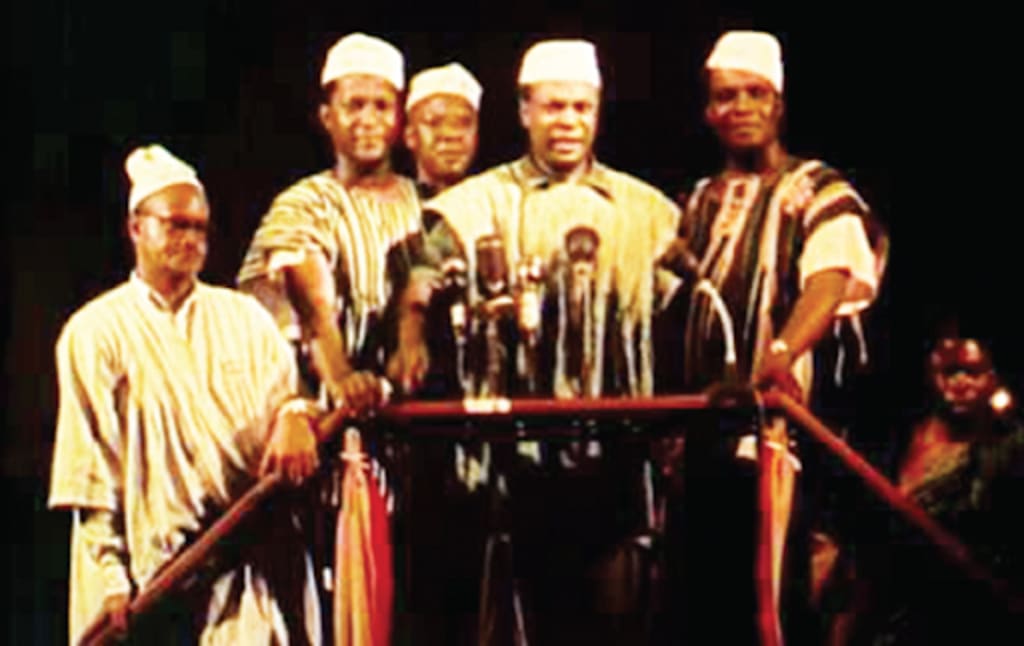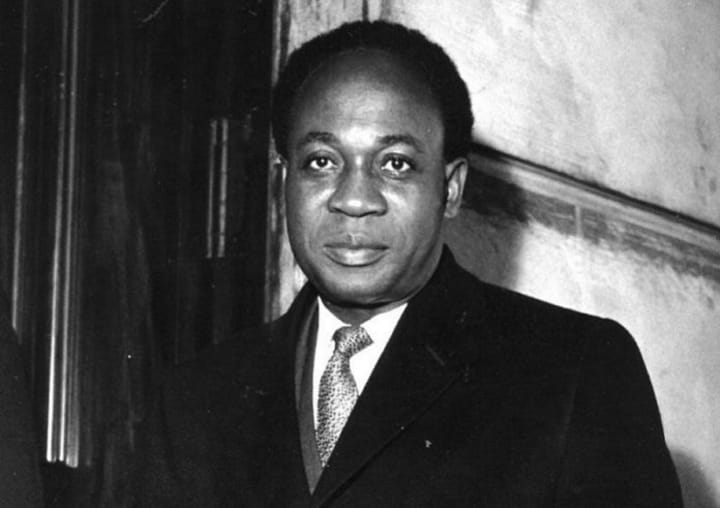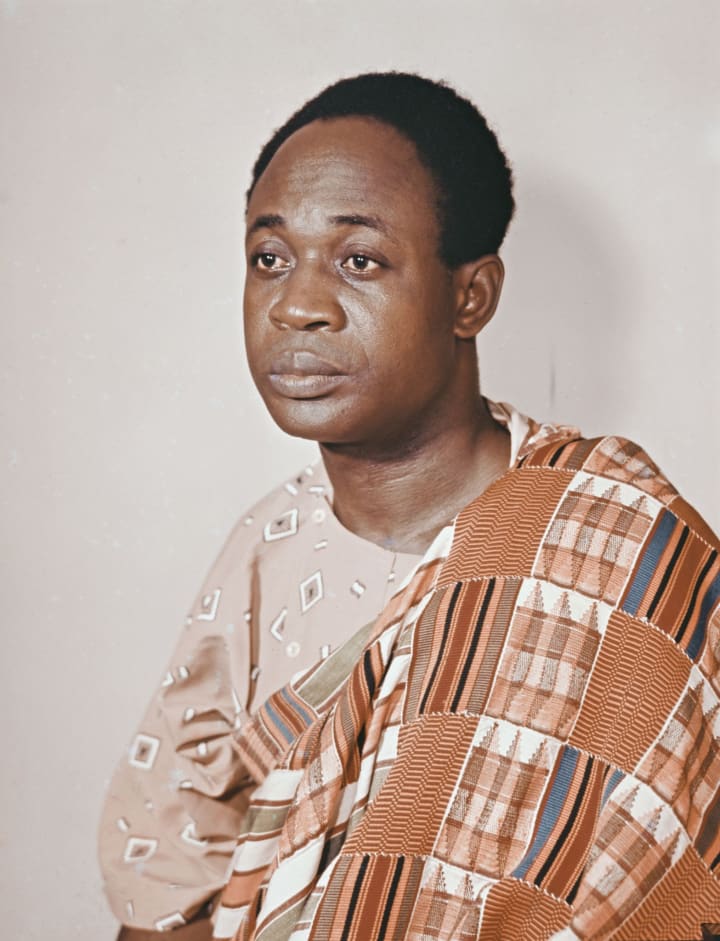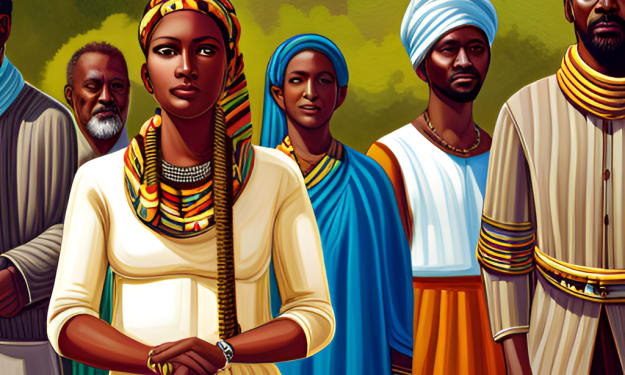The Life of Kwame Nkrumah
From Birth to Legacy

Kwame Nkrumah, a towering figure in African politics, was a visionary leader who fought tirelessly for Ghana's independence from colonial rule. Born on September 21, 1909, in Nkroful, a small village in what was then the British Gold Coast (now Ghana), Nkrumah's early life laid the foundation for his remarkable journey.
Nkrumah's parents, Kofi Ngonloma and Elizabeth Nyaniba, instilled in him a strong sense of determination and the value of education. Despite their modest means, they recognized the transformative power of learning and sent him to a Methodist school at the age of six. Nkrumah's intelligence and dedication quickly became evident as he excelled academically.
His educational journey continued at the prestigious Achimota College, where he studied under prominent African educators who nurtured his passion for politics and activism. During this time, Nkrumah became increasingly aware of the injustices perpetuated by colonial rule and began organizing student protests against British domination.
Nkrumah's thirst for knowledge and his drive to fight for justice led him to pursue further studies in the United States. He enrolled at Lincoln University in Pennsylvania, where he immersed himself in the teachings of prominent African-American scholars. Nkrumah's studies in the fields of sociology, philosophy, and theology expanded his worldview and deepened his understanding of the struggles faced by marginalized communities.
Kwame Nkrumah's formative years in Nkroful shaped his unwavering commitment to Ghana's independence and the liberation of the African continent. Growing up in a close-knit community, he witnessed firsthand the effects of British colonial rule on his people. These experiences fueled his determination to fight for justice and freedom.
Nkrumah's academic achievements and his growing activism set the stage for his return to Ghana in the 1940s. Armed with the knowledge and experiences gained abroad, he became an influential voice in the country's nationalist movement. Nkrumah's charisma, intellect, and passion for change quickly gained him a following among the Ghanaian people.
Kwame Nkrumah's political career was marked by his unwavering dedication to securing Ghana's independence. He became a leading figure in the fight against British colonial rule, using his skills as an organizer and orator to mobilize support for the cause.

In 1947, Nkrumah founded the Convention People's Party (CPP), a political party dedicated to achieving self-government for the people of Ghana. His relentless campaigning and charismatic leadership propelled him to the forefront of the nationalist movement.
On March 6, 1957, Nkrumah's dream became a reality as Ghana gained independence, becoming the first African nation to break free from colonial rule. Nkrumah was appointed as the country's first prime minister and later became its first president.
Kwame Nkrumah's tenure as president was marked by his unwavering commitment to improving the lives of Ghanaians. He implemented ambitious social and economic policies aimed at transforming Ghana into a prosperous and egalitarian nation.
Nkrumah recognized that education was the key to empowerment and development. He established free primary and secondary education programs, making education accessible to all Ghanaian children. Additionally, he established institutions of higher learning such as the University of Ghana, paving the way for a new generation of educated leaders.
Healthcare was another priority for Nkrumah. He spearheaded the construction of hospitals and clinics throughout the country, ensuring thatGhanaians had access to quality medical care. Nkrumah's government also focused on improving infrastructure, investing in the construction of roads, bridges, and other public works projects to connect communities and foster economic growth.
Nkrumah's economic policies aimed to promote self-sufficiency and industrialization. He advocated for the development of local industries and the diversification of Ghana's economy. Through initiatives such as the Volta River Project, which harnessed the power of the Volta River to generate electricity, Nkrumah sought to lay the foundation for Ghana's industrial growth and economic independence.
Despite the ambitious nature of these policies, challenges arose along the way. The cost of implementing such programs strained Ghana's resources, and corruption and mismanagement hindered the full realization of their potential. However, Nkrumah's unwavering commitment to the well-being of his people remained steadfast.
During his presidency, Kwame Nkrumah faced numerous challenges. He encountered political opposition from various groups who disagreed with his policies and methods. The economic landscape also posed challenges, as Ghana experienced a decline in cocoa prices, which impacted its main export industry, and faced increasing inflation.
Despite these obstacles, Nkrumah remained steadfast in his vision for Ghana's progress and continued to push forward with his social and economic policies. However, his presidency was cut short when he was overthrown in a military coup on February 24, 1966, while he was on a state visit to China. Nkrumah's government was overthrown by a coalition of military and civilian opponents who were critical of his leadership.
Following the coup, Nkrumah went into exile, living in several countries including Guinea and Egypt. Despite being physically separated from Ghana, his influence and ideas continued to resonate throughout the African continent. He remained a prominent voice in the fight against colonialism and imperialism, advocating for African unity and the empowerment of African nations.

Kwame Nkrumah's legacy and impact on Ghana and the wider African continent are immeasurable. He was not only a key figure in Ghana's struggle for independence but also a visionary leader who left an indelible mark on the political landscape of Africa.
Nkrumah's ideas of Pan-Africanism and African unity continue to inspire generations of leaders and activists. His belief in the power of solidarity and collective action resonates in movements for social justice across the globe. His advocacy for the rights of all oppressed people, regardless of nationality or ethnicity, exemplifies his commitment to universal freedom and equality.
While his presidency may have been marred by challenges, Kwame Nkrumah's unwavering dedication to Ghana's progress and the liberation of Africa remains a testament to his character and leadership. His contributions to the fight against colonialism and imperialism have left an enduring legacy that continues to shape the aspirations and dreams of future generations.
Today, Ghana recognizes Nkrumah's profound impact on the nation by celebrating his legacy on September 21 as Kwame Nkrumah Memorial Day. His ideas and ideals continue to inspire and guide Ghana as it strives for progress, development, and the realization of a united and prosperous African continent.
About the Creator
Dr. Fred Domezah
Join me on a captivating journey to unravel mysteries, explore scientific breakthroughs, and delve into the complexities of our planet. Get ready to be intrigued as I take you on an exciting voyage of knowledge and discovery.






Comments
There are no comments for this story
Be the first to respond and start the conversation.